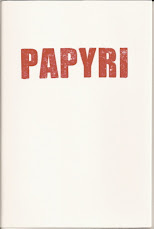
Octavio Paz
(1914-1998)
from “La Verdad contra el Compromiso”
Prólogo al libro
Tristeza de la verdad: André Gide regresa de Rusia
de Alberto Ruy-Sánchez
El ensayo es un género difícil. Por esto, sin duda, en todos los tiempos escasean los buenos ensayistas. En uno de sus extremos colinda con el tratado; en el otro, con el aforismo, la sentencia y la máxima. Además, exige cualidades contrarias: debe ser breve pero no lacónico, ligero y no superficial, hondo sin pesadez, apasionado sin patetismo, completo sin ser exhaustivo, a un tiempo leve y penetrante, risueño sin mover un músculo de la cara, melancólico sin lágrimas y, en fin, debe convencer sin argumentar y, sin decirlo todo, decir lo que hay que decir... Esto fue lo que se me ocurrió después de leer este notable ensayo de Alberto Ruy Sánchez. Su libro pertenece simultáneamente a la historia moderna, a la literatura y a la más viva actualidad: la conversación de André Gide al comunismo, sus años de creyente devoto, sus dudas y su final, valerosa apostasía. Con este libro Ruy Sánchez se ha revelado como uno de nuestros mejores ensayistas. Su escritura es nerviosa y ágil, su inteligencia aguda sin ser cruel, su ánimo compasivo sin condescendencia ni complicidad. El asunto de su ensayo requería todo esto: el episodio de Gide es uno de los capítulos más impresionantes de la historia, casi siempre lamentable, de las relaciones entre los intelectuales del siglo XX y el comunismo. Fue una admirable lección de moral que, como es sabido, muy pocos se atrevieron a imitar.
The essay is a difficult genre. That's why, undoubtedly, in every era, there’s a lack of good essayists. At one end, it’s akin to the treatise; at the other, with the aphorism, the judgment and the maxim. Also, it demands contradictory qualities: it must be brief but not laconic, light and not superficial, deep without heaviness, excited without pathos, complete without being exhaustive, at the same time light and penetrating, smiling without moving a muscle of the face, melancholy without tears and, in end, it must convince without arguing and, without saying everything, say what it is necessary to say... This was what occurred to me after reading this notable essay of Alberto Ruy Sánchez. His book belongs simultaneously to modern history, to literature and to the most vivid actuality: the conversion of André Gide to communism, his years as a devout believer, his doubts and his final, courageous apostasy. With this book Ruy Sánchez has been revealed as one of our best essayists. His writing is nervous and agile, his intelligence sharp without being cruel, his compassionate spirit without condescension or complicity. The material of his essay needed all this: the Gide episode is one of the most impressive chapters of the history, almost always lamentable, of the relations between the intellectuals of the XXth century and communism. It was an admirable moral lesson that, as everyone knows, very few dared to imitate.






.jpg)
No comments:
Post a Comment